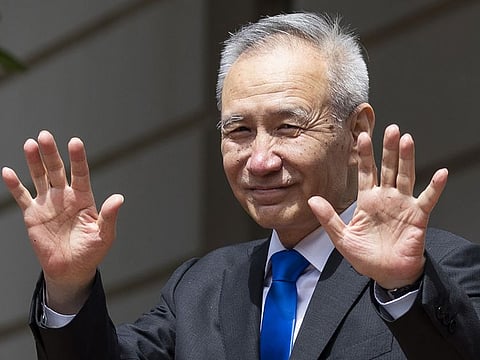China says US trade talks have not broken down
This is only a normal twist in the negotiations, says trade negotiator Liu

Also In This Package
Beijing: China's top trade negotiator said on Friday in Washington that trade talks with the US would continue in Beijing following two days of negotiations and a US tariff hike.
Speaking to reporters in Washington on Friday, Vice Premier Liu He for the first time gave details on where the negotiations stood following two days of talks with US counterparts, with tariffs and how much China should import from America among the disagreements.
"Negotiations have not broken down, but rather on the contrary, this is only a normal twist in the negotiations between the two countries, it is inevitable," Liu said.
"Both sides agree they will meet again in Beijing in the future and keep pushing forward the negotiations," he said without giving a date.
Negotiations have not broken down, but rather on the contrary, this is only a normal twist in the negotiations between the two countries, it is inevitable.Liu He, Vice Premier, on US-China tariff talk
Since last year the United States and China have exchanged tariffs on more than $360 billion in two-way trade, gutting US agricultural exports to China and weighing on both countries' manufacturing sectors.
Liu said the two days of talks in the US were "productive".
"We have a consensus in lots of areas but to speak frankly there are areas we have differences on, and we believe these concern big principles," he said.
Three main issues
First, the Chinese side believes all punitive tariffs must be cancelled if an agreement is reached, he said, indicating that it remained under discussion.
Second, Chinese President Xi Jinping and US President Donald Trump agreed to a preliminary figure for purchases of US goods when they declared a trade truce in Argentina last year, he said.
"In the end, what is the figure? Now both sides have different views, we think this is a very serious thing that cannot be changed easily," he said.
Third, the text of the agreement must be "balanced" between the two sides, he said, because "any country needs its own dignity".
"We believe these are all big matters of principle, every country has important principles, and we will not make concessions on matters of principle."
President Donald Trump, meanwhile, raised tariffs on $200 billion (Dh734 billion) in Chinese goods and ordered officials to launch the process to impose custom duties on another $300 billion worth of imports - almost everything China ships to the US.
'Backtracking'
The negotiations took a downward turn after Trump accused China of reneging on its commitments.
"We believe before we reach a deal, any changes are natural, and inevitable in the whole process," Liu said.
"We don't believe China has backtracked", he said, adding there were just differences on how to phrase the text of the agreement.
Asked about the tariffs that hit $200 billion worth of Chinese goods on Friday, Liu said: "if the the US slaps on tariffs, we must respond."
Noting China would exercise restraint, he added, "(we) don't want unlimited escalation".
Liu compared the negotiations to a marathon: "When you get to the last stage it is comparatively the hardest stage, now we need to hold on, it is the darkness before dawn."
China's economy
Last year the escalating trade tensions with the US pummelled confidence and sent Chinese stock markets sliding about 30 per cent.
Liu, China's top economic official, said the country's economy was improving after bottoming out at the end of last year.
Although there will be some pressure, I believe China's economy will continue to develop smoothly, healthily, in a good state.Liu He, Vice Premier
"The most crucial issues are confidence and expectations," he said, "as long as we in our hearts have confidence, we will not be afraid of any difficulties."
"Although there will be some pressure, I believe China's economy will continue to develop smoothly, healthily, in a good state," he said.
China's monetary and fiscal policy has "ample room" to manoeuvre, Liu said.
"We need to rationally approach this, China is not afraid, and the Chinese nation is not afraid," he said.




